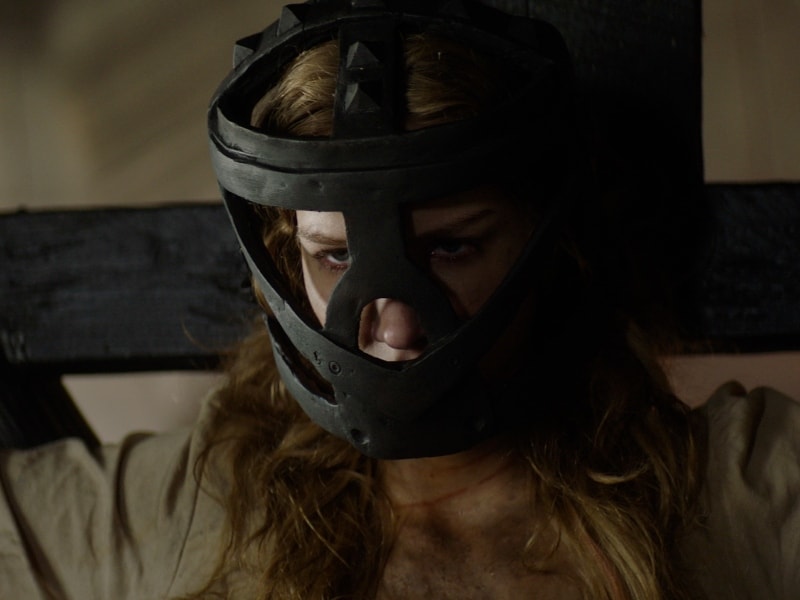
Fantasia International Film Festival runs August 20th through September 2nd as a completely online event. We’re used to attending in person in beautiful Montreal, Canada, but we’re excited to cover this fantastic festival virtually too. Our coverage of this year’s Fantasia Festival continues with our review of Neil Marshall’s The Reckoning.
Neil Marshall made quite the splash upon his arrival in the early 2000s with a one-two punch of genre classics. Dog Soldiers (2002) and The Descent (2004) remain among his most fantastic features, but later films like Doomsday (2008) and Centurion (2010) reveal both an interest and skill at delivering larger-scale action/adventures. He moved those talents to television with memorable gigs on shows like Game of Thrones (2012-2014) and Black Sails (2014), and now he’s back on the big screen seemingly straddling the two halves of his filmography with The Reckoning.
England in the late 17th century is not a pretty place. The Great Plague is winding down after claiming millions of lives around the globe, but death remains a constant. Humankind has found a new target for its ignorance and rage, and that unfortunate punching bag is women accused of witchcraft. Women have always been abused at the hands of men and society at large, but now it comes courtesy of a higher purpose and power — some women are in league with the devil, and only good men of the cloth can wring a confession from their bodies to save their souls.
Grace Haverstock (Charlotte Kirk) is only the latest victim, and her resources to fight back seem slim. Her husband (Joe Anderson) has just died from the plague, her infant daughter is hungry, and even their small farm becomes unmanageable. When the local landlord suggests she pay rent with her sex, Grace refuses and seals her fate. Spurned and injured, he accuses her of witchcraft, and soon she’s incarcerated and brought before a renowned witchfinder named Moorcroft (Sean Pertwee). His methods are cruel, brutal, and invasive, and she has no earthly chance against them. Well, that’s what he’s counting on anyway.
The Reckoning has far more in common with the likes of 1968’s Witchfinder General than it does with the creatures and non-human monsters of Marshall’s genre efforts. There’s horror here, but it comes in the form of mankind’s treatment of its own kind. That’s arguably more horrifying than any supernatural threat or monster could manage as it’s terror based on reality, but the film often feels one step removed from the more visceral aspects of it all.
Part of it is due to Marshall’s preference for cutting away from the myriad of heinous acts committed against Grace in the name of god. It’s the right choice as lingering on them would shift the attention and focus by way of blood, guts, and grue, but it leaves viewers with build up only. Something is suggested — mostly fairly typical torture beats, although one involving the insertion of something heinous between Grace’s legs manages to unsettle — and then we see her having survived the experience. We know what’s happened, but the choice was made to leave Grace looking fairly unscathed and undisturbed by it all. Her performance suggests life before and during the torture was horrible, but her hair and makeup suggest otherwise.
Thankfully, the majority of the film’s visual elements succeed far better. Luke Bryant’s cinematography and Ian Bailie’s production design work beautifully to create striking imagery. From attractive shots and camera work to the ugliness of a world in chaos, The Reckoning shows Marshall’s sharp eye at work. Grace begins experiencing vivid dreams and visions of devilish antics up to and including her fornicating with Satan. The film’s third act delivers more eye-candy and some action as things grow more heated.
The film’s central issue, though, is more about what it doesn’t do than what it does. We’ve seen these church-led torture scenes before, and the script by Edward Evers-Swindell, Marshall, and Kirk doesn’t have anything to add (outside of an intriguing comment about the legion of widowers left behind). Grace is a good woman terrorized by a fearful, sexist society as part of god’s plan — and that’s it really. There no real commentary on the sexes here beyond the obvious. Grace’s married but conflicted friend Kate (Sarah Lambie) stands out as a more interesting character, but she’s brushed too easily to the side. With the action saved for the final fifteen minutes it’s hardly a rousing adventure, and that leaves viewers with a historical drama with little to say.
The Reckoning is an attractive tale about ugly times and deeds. End text states the magnitude of it all with an estimated five hundred thousand women “tried” and murdered in god’s name, but it leaves the film feeling like a history lesson for a lesson already learned. Still, some lessons need repeating, and the film’s finale does offer some burning catharsis.
Follow our coverage of Fantasia 2020 here.
Related Topics: Fantasia Film Festival, Neil Marshall, The Reckoning
